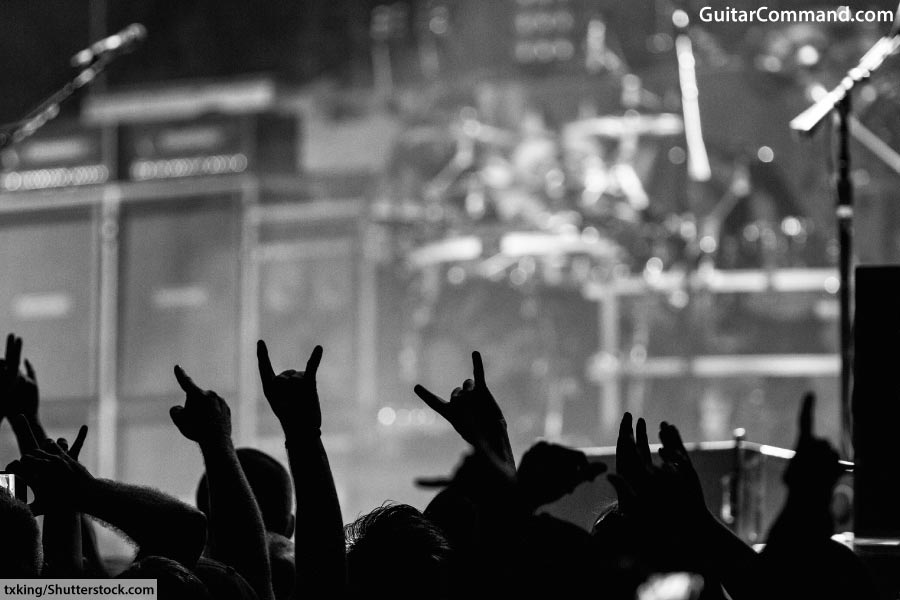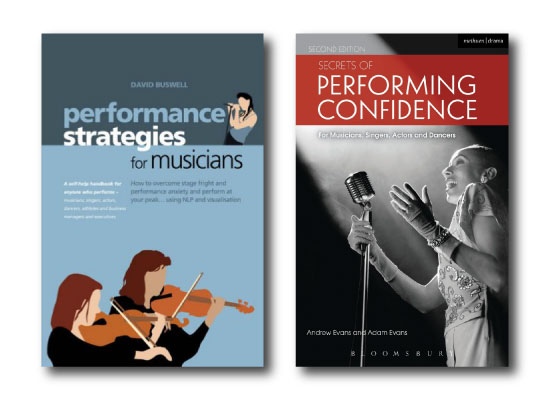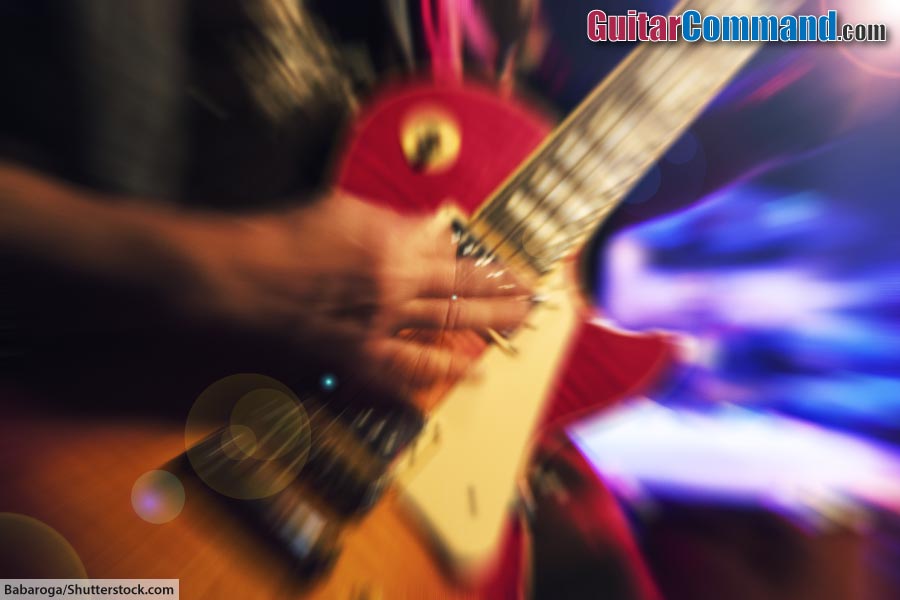Stage fright is a primitive physical response to a frightening situation. Your stone-age ancestor felt the same rush of adrenaline, the same crippling anxiety, trembling and shortness of breath when confronted by a saber-tooth tiger.
The stone-age you would have used this adrenaline burst either to slay the saber-tooth tiger or to run away.
When you're a guitarist confronting an audience, those options aren't appropriate (however tempting), so how do you channel your flood of adrenaline productively?
In this article, we suggest practical tips on how to overcome stage fright, ranging from breathing exercises to eating a banana (really).
You’re Not Alone!
An important part of dealing with stage fright is to know that you're not alone; every musician and singer, famous or otherwise, has suffered from performance anxiety at some point in his or her career.
Re-Frame Your Fears
Some musicians claim that pre-performance nerves are beneficial, giving them an edge while on stage. They have a point; no-one wants to watch a performer who seems bored and uninvolved.
Mentally re-framing your stage fright as performance-enhancing energy is a useful tactic in overcoming performance anxiety.
Accept that some nervousness is normal and can even be beneficial, as it can make you more alert and energetic.

The Importance Of Movement
Both fighting and fleeing require physical exertion. Stage fright prepares your body for these eventualities without offering a release.
Musicians are particularly vulnerable to stage fright because they are concentrating on small hand and finger movements while the rest of the body remains still, making it difficult to release the excess adrenaline.
To counteract this, try doing some physical exercises before a performance. You don't have to run a marathon; easy stretches, squats, arm windmills, star jumps or similar exercises can be used to limber up before a show. A short, brief walk is also very helpful, but don't get lost!
This physical movement will help to release some of the nervous energy and take your mind off the forthcoming performance.
You could also try progressive muscle relaxation, which involves tensing and then relaxing different muscle groups. It helps in reducing physical tension, which is often a part of stage fright.
Breathe!

Deep, slow breathing can help reduce physical symptoms of anxiety like a racing heart or shaking hands. Practice breathing exercises regularly and use them before going on stage.
Practices like mindfulness and meditation can help you stay centered and calm your nerves.
Practice Makes Perfect
As a musician you're used to having to practice in order to improve your playing skill. Improving your performing skill is no different.
Take the long view and view each performance as part of an ongoing learning process.
If anything does go wrong, it is merely part of your development as a performer. Learn from it and move on; being practical and detached removes much of the pressure from individual performances.
Overcome Stage Fright By Playing To A Friendly Crowd
Starting small is a good first step towards overcoming stage fright. If possible, start with smaller, less intimidating audiences and gradually work your way up to larger groups. This will help build confidence.
Performing regularly for a sympathetic "home crowd", such as family and friends, will help you view the audience as friendly and participatory who simply want to share and participate while you play.
Start by performing material that you find easy to play. By doing this, your confidence will rapidly increase.

The Importance Of Good Preparation
It was former Secretary of State James Baker who coined the phrase "Prior Preparation Prevents Poor Performance", also known as the "five P's".
(In the British army, it is known as the "7 p's": "Proper Planning and Preparation Prevents Piss Poor Performance"!)
Baker presumably wasn't referring to a rock gig, but his words stand true for any potentially challenging situation.
Preparing for the gig involves not only knowing the music inside and out, but also being in control of all other aspects of a performance.
Know What You Are Playing
Knowing the music intimately should go without saying. Thoroughly practice your part so that the actual playing element of the gig is the least of your worries. Learn any lyrics by heart. Double-check with the band to make sure that everyone remembers the last-minute changes made during the final rehearsal.
Prepare a set list and make sure that every member of the band has an identical copy.
Plan for every eventuality. Have you got an encore ready? Will you talk between songs? What songs can you remove from the set if time is short? What will you do if you break a string?
Be aware of how long the journey to the venue will take, and leave plenty of time to get there. Combat stage fright by leaving nothing to chance!
Control Your Environment

You should aim to be in total control of your environment by making sure that everything outside of the performance itself is under control.
Know where you're meant to be and when, how to get on and off the stage and how long you're meant to be playing for.
Being in control of your environment includes making sure that everything outside of the performance itself is under control. Know how you'll get on and off stage, who the key people are (sound mixer, promoter, etc.), where your gear will be, who'll be taking it on and off stage, etc.
Pre-Gig Checklist
In the days before the gig, prepare a pre-gig checklist. Examples of things you might want to add to the list include:
- Address of venue, and directions if hard to find.
- Confirmation of dates and times: performance date and time, sound-check time, doors opening, etc.
- Parking information for unloading, and for during the show if different.
- Phone number of contact(s) for gig.
- Names of key staff (stage manager, sound tech, etc.)
- Other venue or performance-specific items / information (back-stage passes, etc.)
- How you are getting paid (and how much)
Guitar-specific items for your check list include your standard gear list, together with:
- spare strings and necessary tools,
- back-up guitar(s),
- batteries,
- power adapters,
- tuner
Get Through The First Five Minutes
The effects of adrenaline are short lived. Bear this in mind when you are planning your performance. Technically demanding pieces should be positioned towards the end. Start with pieces that are familiar and easy to play.
After five to ten minutes the effects of stage fright have usually worn off; use this knowledge to your advantage.
From the beginning of the gig, try to connect with the audience. Try to make eye contact with friendly faces, and use relaxed, confident body language. This can make the experience feel more like a conversation and less like a performance.
Smiling is known to reduce stress levels, so even if you're deadpan on stage, you could have a laugh with your band mates before you go on.
Visualization And Other Mental Strategies
Athletes talk of "focus" and "tunnel vision". Musicians can do exactly the same. Visualize a successful performance and imagine how it feels. Don't be put off by external influences, and focus only on achieving what you have visualized.
Once you know how a successful performance feels, all you have to do is work backwards to achieve it!
Replace negative thoughts with affirmations and positive self-talk.
Concentrate On The Performance, Not On Yourself
Bear in mind that when performing you are simply doing what you love to do. Concentrate on playing the music to the best of your ability – if you are enjoying your performance, your audience will be too.
By focusing on the music, rather than yourself, you instantly remove much of the pressure. You are simply a conduit, passing on notes and sounds that will arouse positive emotions in others.
Removing yourself from the equation is a good strategy, particularly if you are not a natural extrovert.
Worst Case Scenario
Another way to overcome stage fright is to imagine the worst case scenario. This could be anything from forgetting the music to making a mistake and having to start a song again.
Whatever happens, it won't be the end of the world. Stage fright is partly a fear of the unknown. If you visualize all eventualities, they become familiar and less frightening.
Overcome Stage Fright By Eating A Banana
One little-known tip on how to overcome stage fright is to eat one or two bananas an hour before the performance. Although it sounds like a myth, it may have its roots in science: the potassium in bananas is said to reduce stress.
Should You Drink Before A Performance?
Stay away from alcohol or other substances. They can impair your performance and increase anxiety over time. (Save it for after the show!)
Conclusion
Concert pianist Stephen Hough has called Liszt “the man who invented stage fright”. It was Liszt who established the rule that pianists should not follow the score when playing at piano recitals, placing a great deal of pressure on pianists to remember each note faithfully.
However, Hough points out that while some musicians would dissolve into performance anxiety without the music, other musicians are inhibited by the effort of following the score too closely. Try to find what works for you rather than tailoring your performance to arbitrary rules set by others.
Every musician has experienced performance anxiety to some degree. If you do suffer from stage fright, be practical and examine what you can do to alleviate the symptoms and even to use them to your advantage.
Treat those first concerts as part of the journey and continue to learn as you go.
Remember, once you make it through those first ten minutes you’ll find yourself in “the zone”… and those saber-tooth tigers in the audience won’t seem so intimidating.
Further Reading
These books offer further information on how to overcome stage fright.

Secrets Of Performing Confidence
Performance Strategies For Musicians
How Do You Cope With Stage Fright?
Do you have any advice on how to overcome stage fright? Help other musicians by sharing your experiences in the comments below!


